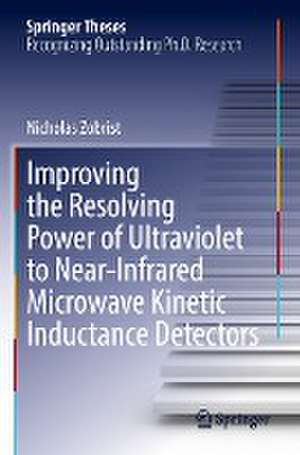Improving the Resolving Power of Ultraviolet to Near-Infrared Microwave Kinetic Inductance Detectors: Springer Theses
Autor Nicholas Zobristen Limba Engleză Paperback – 13 dec 2023
| Toate formatele și edițiile | Preț | Express |
|---|---|---|
| Paperback (1) | 991.86 lei 6-8 săpt. | |
| Springer International Publishing – 13 dec 2023 | 991.86 lei 6-8 săpt. | |
| Hardback (1) | 997.71 lei 6-8 săpt. | |
| Springer International Publishing – 13 dec 2022 | 997.71 lei 6-8 săpt. |
Din seria Springer Theses
- 18%
 Preț: 997.88 lei
Preț: 997.88 lei -
 Preț: 389.88 lei
Preț: 389.88 lei - 15%
 Preț: 646.94 lei
Preț: 646.94 lei - 18%
 Preț: 943.43 lei
Preț: 943.43 lei -
 Preț: 399.29 lei
Preț: 399.29 lei - 18%
 Preț: 944.99 lei
Preț: 944.99 lei - 15%
 Preț: 636.80 lei
Preț: 636.80 lei - 18%
 Preț: 941.05 lei
Preț: 941.05 lei - 15%
 Preț: 643.16 lei
Preț: 643.16 lei - 15%
 Preț: 642.68 lei
Preț: 642.68 lei - 18%
 Preț: 1103.62 lei
Preț: 1103.62 lei - 20%
 Preț: 558.82 lei
Preț: 558.82 lei - 18%
 Preț: 1112.30 lei
Preț: 1112.30 lei - 18%
 Preț: 944.19 lei
Preț: 944.19 lei - 18%
 Preț: 1109.92 lei
Preț: 1109.92 lei - 18%
 Preț: 1217.27 lei
Preț: 1217.27 lei - 15%
 Preț: 640.06 lei
Preț: 640.06 lei - 15%
 Preț: 636.45 lei
Preț: 636.45 lei - 15%
 Preț: 640.06 lei
Preț: 640.06 lei - 15%
 Preț: 640.88 lei
Preț: 640.88 lei -
 Preț: 389.70 lei
Preț: 389.70 lei - 20%
 Preț: 563.89 lei
Preț: 563.89 lei -
 Preț: 393.35 lei
Preț: 393.35 lei - 15%
 Preț: 637.93 lei
Preț: 637.93 lei - 15%
 Preț: 641.85 lei
Preț: 641.85 lei - 18%
 Preț: 1225.94 lei
Preț: 1225.94 lei - 20%
 Preț: 551.36 lei
Preț: 551.36 lei - 18%
 Preț: 1229.10 lei
Preț: 1229.10 lei - 15%
 Preț: 639.25 lei
Preț: 639.25 lei - 18%
 Preț: 999.45 lei
Preț: 999.45 lei - 15%
 Preț: 640.06 lei
Preț: 640.06 lei - 18%
 Preț: 1220.45 lei
Preț: 1220.45 lei - 18%
 Preț: 1116.26 lei
Preț: 1116.26 lei - 18%
 Preț: 1110.72 lei
Preț: 1110.72 lei - 18%
 Preț: 1000.87 lei
Preț: 1000.87 lei - 18%
 Preț: 891.17 lei
Preț: 891.17 lei - 15%
 Preț: 640.06 lei
Preț: 640.06 lei - 5%
 Preț: 1154.07 lei
Preț: 1154.07 lei - 15%
 Preț: 635.96 lei
Preț: 635.96 lei - 15%
 Preț: 640.88 lei
Preț: 640.88 lei -
 Preț: 387.20 lei
Preț: 387.20 lei - 18%
 Preț: 1109.92 lei
Preț: 1109.92 lei -
 Preț: 385.25 lei
Preț: 385.25 lei -
 Preț: 385.25 lei
Preț: 385.25 lei - 18%
 Preț: 1112.30 lei
Preț: 1112.30 lei - 18%
 Preț: 999.45 lei
Preț: 999.45 lei -
 Preț: 386.99 lei
Preț: 386.99 lei - 15%
 Preț: 637.13 lei
Preț: 637.13 lei - 20%
 Preț: 554.20 lei
Preț: 554.20 lei - 20%
 Preț: 555.57 lei
Preț: 555.57 lei
Preț: 991.86 lei
Preț vechi: 1209.59 lei
-18% Nou
Puncte Express: 1488
Preț estimativ în valută:
189.79€ • 198.66$ • 157.97£
189.79€ • 198.66$ • 157.97£
Carte tipărită la comandă
Livrare economică 31 martie-14 aprilie
Preluare comenzi: 021 569.72.76
Specificații
ISBN-13: 9783031179587
ISBN-10: 3031179587
Pagini: 123
Ilustrații: XVIII, 123 p. 31 illus., 27 illus. in color.
Dimensiuni: 155 x 235 mm
Greutate: 0.21 kg
Ediția:1st ed. 2022
Editura: Springer International Publishing
Colecția Springer
Seria Springer Theses
Locul publicării:Cham, Switzerland
ISBN-10: 3031179587
Pagini: 123
Ilustrații: XVIII, 123 p. 31 illus., 27 illus. in color.
Dimensiuni: 155 x 235 mm
Greutate: 0.21 kg
Ediția:1st ed. 2022
Editura: Springer International Publishing
Colecția Springer
Seria Springer Theses
Locul publicării:Cham, Switzerland
Cuprins
Chapter 1. Introduction and Motivation.- Chapter 2. MKID Physics.- Chapter 3. Data Analysis.- Chapter 4. Sensor Materials.- Chapter 5. Detector and Readout Noise.- Chapter 6. Solving the Phonon Problem.- Chapter 7. Conclusions.
Notă biografică
Nicholas Zobrist’s professional experience spans a wide range of low temperature physics from dark matter detection to quantum limited amplification. He received his Ph.D. from the University of California, Santa Barbara in June 2022. At Santa Barbara, Nicholas worked on the design and development of superconducting sensors for astrophysical measurements, specifically for measuring the properties of planets orbiting other stars. Instruments that he’s contributed to in this vein have been deployed at Palomar Observatory and the Subaru telescope on Mauna Kea. Additionally, in 2017 he was awarded a NASA fellowship for improving the energy resolution of these devices.
Textul de pe ultima copertă
This thesis represents a breakthrough in our understanding of the noise processes in Microwave Kinetic Inductance Detectors (MKIDs). While the detection of ultraviolet to near-infrared light is useful for a variety of applications from dark matter searches to biological imaging and astronomy, the performance of these detectors often limits the achievable science. The author’s work explains the limits on spectral resolution broadening, and uses this knowledge to more than double the world record spectral resolution for an MKID suitable for optical and near-IR astrophysics, with emphasis on developing detectors for exoplanet detection. The techniques developed have implication for phonon control in many different devices, particularly in limiting cosmic ray-induced decoherence in superconducting qubits. In addition, this thesis is highly accessible, with a thorough, pedagogical approach that will benefit generations of students in this area.
Caracteristici
Presents dramatic improvements in the performance of MKIDs Describes applications to exoplanet imaging Provides an accessible introduction to MKID physics and exoplanet discovery
